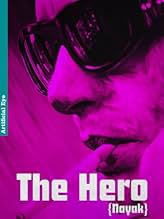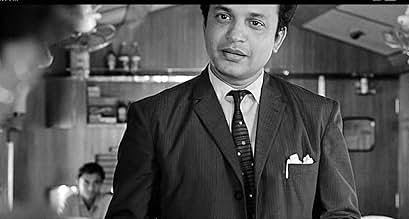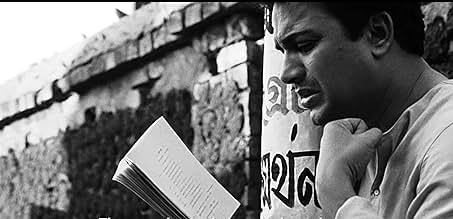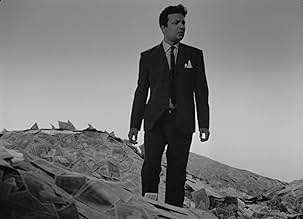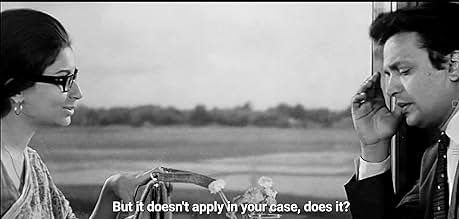AVALIAÇÃO DA IMDb
8,3/10
5,6 mil
SUA AVALIAÇÃO
Adicionar um enredo no seu idiomaEn route to Delhi to receive an award, a Bengali film star reevaluates his success through his fellow passengers, dreams, and past experiences.En route to Delhi to receive an award, a Bengali film star reevaluates his success through his fellow passengers, dreams, and past experiences.En route to Delhi to receive an award, a Bengali film star reevaluates his success through his fellow passengers, dreams, and past experiences.
- Prêmios
- 8 vitórias e 1 indicação no total
Kamu Mukherjee
- Pritish Sarkar
- (as Kamu Mukhopadhyay)
Susmita Mukherjee
- Molly (Mr. Sarkar's wife)
- (as Susmita Mukhopadhyay)
Subrata Sensharma
- Ajoy
- (as Subrata Sen)
Jogesh Chatterjee
- Aghore, elderly journalist
- (as Jogesh Chattopadhyay)
Satya Banerjee
- Swamiji
- (as Satya Bandyopadhyay)
Avaliações em destaque
Satyajit Ray's Nayak tells the story of a film star. Of course, in mainstream Indian cinema, leading men are known as heroes, and the interesting paradox about the star of this film (which is probably true of most film stars who enjoy great public adulation) is that beneath this fake façade of stardom, fans, and fame, lies a man with a truly wounded soul, someone who has seemingly accomplished everything in his career but has actually accomplished nothing of what he would have probably wished for, both a person and and as an artiste. A very interesting concept of course which is adapted onto the screen in a most authentic and engaging picture. The film might not be Ray's best film, but it's still Ray's film after all, so how can one even expect anything less than that.
Satyajit Ray is, needless to say (sometimes even embarrassing to have to say that), a master director, a master storyteller, and this film is no exception in the illustrious list of evidence to his talent. Nayak is meaningful, highly absorbing, and to me it's a visual treat. The camera work and lighting are spectacular for a black-and-white film, and the setting of most of the story within a train makes for a delightful watch not only visually but culturally. Culturally because the decorative elegance, the restaurant, the order, as well as the crowd of passengers, wouldn't normally be associated with Indian trains of that period and might raise several eyebrows among non-Indians. The moving train demonstrates breathtaking views as the script moves through its conversational episodes.
Nayak works as a story, as a film, but in many ways as a poem, full of hidden, thought-provoking messages, and as a psychology textbook full of interesting insights of the human soul. The film also provides the viewer with a glimpse into the world of filmmaking from the actors' standpoint. While the story of a film hero who is actually nothing of the sort in real life is actually not big news to anyone nor is it a terribly original idea for a film, Ray makes it into such a personal story that the lead character's being an actor becomes just a random plot element. Ray takes us into his troubled world and does so with extraordinary symbolism. Take the dream sequences just as an example of Ray's profound mastery.
Naturalistic acting is to be expected in Ray films. Uttam Kumar is excellent in this author-backed role. Very few films of that era, not only in India, allowed this much of character depth and complexity, in fear of confusing the moviegoing public, but Ray knew how to balance it well, and Kumar plays the mix of Arindam's stylish appearance and inner conflict exceedingly well. Sharmila Tagore is luminous as the young, morally upright and compassionate journalist who learns to see the person behind the star and the story behind the item. She is grace personified with her elegant demeanor and restrained delivery. These two make this film what it is, and their interactions give the film its intellectual weight. The conclusion of the story is more than optimistic thanks to Ray's keen, optimistic vision.
Satyajit Ray is, needless to say (sometimes even embarrassing to have to say that), a master director, a master storyteller, and this film is no exception in the illustrious list of evidence to his talent. Nayak is meaningful, highly absorbing, and to me it's a visual treat. The camera work and lighting are spectacular for a black-and-white film, and the setting of most of the story within a train makes for a delightful watch not only visually but culturally. Culturally because the decorative elegance, the restaurant, the order, as well as the crowd of passengers, wouldn't normally be associated with Indian trains of that period and might raise several eyebrows among non-Indians. The moving train demonstrates breathtaking views as the script moves through its conversational episodes.
Nayak works as a story, as a film, but in many ways as a poem, full of hidden, thought-provoking messages, and as a psychology textbook full of interesting insights of the human soul. The film also provides the viewer with a glimpse into the world of filmmaking from the actors' standpoint. While the story of a film hero who is actually nothing of the sort in real life is actually not big news to anyone nor is it a terribly original idea for a film, Ray makes it into such a personal story that the lead character's being an actor becomes just a random plot element. Ray takes us into his troubled world and does so with extraordinary symbolism. Take the dream sequences just as an example of Ray's profound mastery.
Naturalistic acting is to be expected in Ray films. Uttam Kumar is excellent in this author-backed role. Very few films of that era, not only in India, allowed this much of character depth and complexity, in fear of confusing the moviegoing public, but Ray knew how to balance it well, and Kumar plays the mix of Arindam's stylish appearance and inner conflict exceedingly well. Sharmila Tagore is luminous as the young, morally upright and compassionate journalist who learns to see the person behind the star and the story behind the item. She is grace personified with her elegant demeanor and restrained delivery. These two make this film what it is, and their interactions give the film its intellectual weight. The conclusion of the story is more than optimistic thanks to Ray's keen, optimistic vision.
A least seen movie of Satyajit. Satyajit is one of the very few great directors who worked outside Hollywood circle and gave a lot to the film history. He is mostly know to the movie lovers as the creator of great APU TRILOGY. I feel that Ray's works are severely under-represented in USA, although most of his works are masterpiece or near-masterpiece. Thanks to Ishmael Marchent for arranging a retrospective on Ray's works at USA in 1996, I guess. But again in that retrospective, I didn't see the names of some of his great works, like NAYAK, KUNCHENJUNGHA, SEEMABADHYA, ARANYER DIN RATRI or SONAR KELLA. Names of the films that I always see in a Satyajit Festival are the APU TRILOGY, JALSHAGHAR, CHARULATA, GHARE-BAIRE ... etc. No doubt that all of those are great works of Ray, but indeed one cannot know the power of his filmmaking unless he sees some of his other less known works (some of which I mentioned).
Nayak is a simple story of the most popular Film Actor of India, acted with all perfection by great Indian Actor Uttam Kumar, who goes to the capital city Delhi to receive an award of his achievement via a train. On the train he meets Shormila Tagore (Another favorite actress of Satyajit whom he casted in several other movies like, Apur Sansar, Devi, Aranyer Din Ratri, Seemabadhya ... etc.) and some other characters of the story. The story progresses when Uttam discusses with different aspects of his life and career with others (especially with Shormila). In depth thoughts and feelings of UTTAM sprung out as time goes by and Shormila discovers the very lonely man in Uttam hidden behind his day to day charismatic lifestyle.
On my judgement, NAYAK is the greatest creation of RAY. UTTAM's acting can challenge anyone in the motion picture history. The high abstratness and philosophical bent of the movie is comparable to that of CITIZEN KANE (according to me, better than CITIZEN KANE) and the mutual conversations among the characters or the screenplay in other words, can beat those of MINDWALK, VANYA ON 42nD STREET, RED or CASABLANCA. A must see film for all great movie lovers. A 10+ out of 10.
Nayak is a simple story of the most popular Film Actor of India, acted with all perfection by great Indian Actor Uttam Kumar, who goes to the capital city Delhi to receive an award of his achievement via a train. On the train he meets Shormila Tagore (Another favorite actress of Satyajit whom he casted in several other movies like, Apur Sansar, Devi, Aranyer Din Ratri, Seemabadhya ... etc.) and some other characters of the story. The story progresses when Uttam discusses with different aspects of his life and career with others (especially with Shormila). In depth thoughts and feelings of UTTAM sprung out as time goes by and Shormila discovers the very lonely man in Uttam hidden behind his day to day charismatic lifestyle.
On my judgement, NAYAK is the greatest creation of RAY. UTTAM's acting can challenge anyone in the motion picture history. The high abstratness and philosophical bent of the movie is comparable to that of CITIZEN KANE (according to me, better than CITIZEN KANE) and the mutual conversations among the characters or the screenplay in other words, can beat those of MINDWALK, VANYA ON 42nD STREET, RED or CASABLANCA. A must see film for all great movie lovers. A 10+ out of 10.
I have never seen an Indian movie quite like Nayak. Ray has forayed into parallel story telling, like Kurasawa's Rashomon and into dream logic like Bunuel's The Discreet Charm of the Bourgeoisie. I would personally rate it above Bergman's The Magician which also dealt with a similar theme of an actor's reality and people's acceptance of him as a super human and their reluctance of considering him as a human being. Between the two of them, Nayak is more easy to understand whereas The Magician puts its characters in various shades of good and evil throughout its running time.
No such dramatics here and this movie is as good as it gets. I would rate it as one of his best movies amongst Pather Panchali and Charulata. The dream sequences were very well produced and were relevant to the storyline on a sub-conscious level.
The subtitling on the Angel DVD wasn't very well done and the dialogues sometimes whizz by without us being able to read them in time. For people who are familiar with Indian languages, it may not be such a big deal since several of the Bengali words can be understood by them; however for non-Indian speakers this may come across as irritating.
On a personal note, I am sometimes glad that not many people know about Ray because then I am able of recommending him to people who are in the know of the movie industry.
No such dramatics here and this movie is as good as it gets. I would rate it as one of his best movies amongst Pather Panchali and Charulata. The dream sequences were very well produced and were relevant to the storyline on a sub-conscious level.
The subtitling on the Angel DVD wasn't very well done and the dialogues sometimes whizz by without us being able to read them in time. For people who are familiar with Indian languages, it may not be such a big deal since several of the Bengali words can be understood by them; however for non-Indian speakers this may come across as irritating.
On a personal note, I am sometimes glad that not many people know about Ray because then I am able of recommending him to people who are in the know of the movie industry.
I was around 14 years old when I first saw this masterpiece of Satayajit Ray. One very common thing between Ray and Kurosawa I noticed was introspection of perception.
A train journey allows a superstar to introspect his life and career which leaves him in shattered pieces. Uttam Kumar as Arindam was simply unbelievable and so was Shartmila Tagore as the reporter who was acting as a mirror (much needed) for Arindam to reflect.
This movie will give everyone a glimpse of the price paid to succeed. Success here is the Devil and greed here is the devil's advocate.... the price..........."SOUL"
A must watch if you are a movie lover....My Vote - 9/10
A train journey allows a superstar to introspect his life and career which leaves him in shattered pieces. Uttam Kumar as Arindam was simply unbelievable and so was Shartmila Tagore as the reporter who was acting as a mirror (much needed) for Arindam to reflect.
This movie will give everyone a glimpse of the price paid to succeed. Success here is the Devil and greed here is the devil's advocate.... the price..........."SOUL"
A must watch if you are a movie lover....My Vote - 9/10
10sbaindia
A movie at par with Citizen Kane and Rashomon and IMO even better than them in some ways. Impeccable direction and superb acting. Makes you wonder why these two - the actor and director not get together more often in Satyajit Roy films. The angst was so real it seems the guy is not acting any more - just telling his story as it is. The dream sequencewas outstanding as was the ending. The characterisation had on occasion skirted around the burlesque with the older actor in his first interaction with the protagonist but that made the scene all the more poignant. The underlying philosophy is not too deep but something that one can deeply empathise with. The greatness of this movie is how perfectly the story is told. There is an aura of dramatic tension throughout, not between the characters but within the protagonist himself. I would sincerely recommend this movie to anyone who loves what cinema is all about.
Você sabia?
- CuriosidadesDirector Satyajit Ray had written the script of this movie considering only Uttam Kumar in the lead role. He had confessed that if Uttam Kumar had refused it, he would've abandoned the project altogether.
- Citações
Arindam Mukherjee: There's no scope of overacting in front of camera; if you overact a little, then it will magnify tenfold in the camera.
Principais escolhas
Faça login para avaliar e ver a lista de recomendações personalizadas
- How long is The Hero?Fornecido pela Alexa
Detalhes
- Tempo de duração1 hora 57 minutos
- Cor
- Mixagem de som
- Proporção
- 1.37 : 1
Contribua para esta página
Sugerir uma alteração ou adicionar conteúdo ausente


